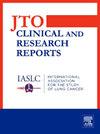Brief Report: Clinical Characteristics and Outcomes of Patients With Thoracic SMARCA4-Deficient Undifferentiated Tumors
IF 3
Q2 ONCOLOGY
引用次数: 0
Abstract
Introduction
Thoracic SMARCA4-deficient undifferentiated tumors (SMARCA4-UTs) are a recently defined group of aggressive cancers in which the effectiveness of standard treatments for lung cancer is unknown.
Methods
We collected clinical, pathologic, and demographic variables from five institutions for patients whose tumors met criteria for SMARCA4-UTs (undifferentiated phenotype and loss of SMARCA4 (BRG1) by immunohistochemistry).
Results
We identified 92 patients with SMARCA4-UTs; 58 (63%) had stage IV disease at diagnosis and 16 (17%) developed recurrent or metastatic disease after initial diagnosis. Median overall survival from metastatic diagnosis was 7.3 (95% confidence interval [CI]: 4.6–12.8) months. Of patients with metastatic disease, 58 (78%) received first-line systemic treatment. Most often, patients received chemo and immunotherapy combination (41%), chemotherapy alone (33%), or immunotherapy alone (16%). Median progression-free survival from start of systemic therapy was 1.9 (95% CI: 1.4–14.5) months for chemo and immunotherapy, 1.6 (95% CI: 1.1–5.8) months for chemotherapy, and 3.3 (95% CI: 1.2–undefined) months for immunotherapy alone. Five patients had durable responses (≥2 y); all received immunotherapy as part of first-line regimens. Nine (16%) of 55 tumor samples tested had programmed death-ligand 1 expression more than or equal to 50%, with 24 (44%) negative samples. Tumor mutational burden was available in 48 cases (52%), and median was 10.5 (range: 2–48) mutations per megabase.
Conclusions
This multi-institution retrospective cohort analysis revealed a population of patients with short progression-free survival to standard therapies and poor overall survival. A few patients had remarkable response to regimens including immunotherapy. Prospective clinical studies are urgently needed to identify better therapeutic approaches to treat this aggressive malignancy, and this analysis may serve as a benchmark for future clinical trial design.
简要报告:胸部smarca4缺陷未分化肿瘤患者的临床特征和预后
简介:胸部SMARCA4缺失性未分化肿瘤(SMARCA4-UTs)是最近定义的一组侵袭性癌症,肺癌的标准治疗方法对其疗效尚不清楚:我们从五个机构收集了肿瘤符合SMARCA4-UT标准(未分化表型和免疫组化SMARCA4 (BRG1)缺失)的患者的临床、病理和人口统计学变量:我们发现了92例SMARCA4-UTs患者,其中58例(63%)在确诊时处于IV期,16例(17%)在初次确诊后出现复发或转移性疾病。确诊转移后的中位总生存期为 7.3 个月(95% 置信区间 [CI]:4.6-12.8 个月)。在转移性疾病患者中,有58人(78%)接受了一线系统治疗。大多数患者接受了化疗和免疫疗法联合治疗(41%)、单独化疗(33%)或单独免疫疗法(16%)。从开始接受全身治疗起,化疗和免疫疗法的中位无进展生存期为1.9个月(95% CI:1.4-14.5个月),化疗为1.6个月(95% CI:1.1-5.8个月),单用免疫疗法为3.3个月(95% CI:1.2-未定义)。五名患者的反应持久(≥2 年);所有患者都接受了作为一线治疗方案一部分的免疫疗法。在检测的55份肿瘤样本中,9份样本(16%)的程序性死亡配体1表达量大于或等于50%,24份样本(44%)为阴性。48个病例(52%)的肿瘤突变负荷可用,中位数为10.5(范围:2-48)个突变/兆碱基:这项多机构回顾性队列分析显示,患者的标准疗法无进展生存期短,总生存期差。少数患者对包括免疫疗法在内的治疗方案有明显反应。目前急需进行前瞻性临床研究,以确定治疗这种侵袭性恶性肿瘤的更好的治疗方法,这项分析可作为未来临床试验设计的基准。
本文章由计算机程序翻译,如有差异,请以英文原文为准。
求助全文
约1分钟内获得全文
求助全文
来源期刊

JTO Clinical and Research Reports
Medicine-Oncology
CiteScore
4.20
自引率
0.00%
发文量
145
审稿时长
19 weeks
 求助内容:
求助内容: 应助结果提醒方式:
应助结果提醒方式:


